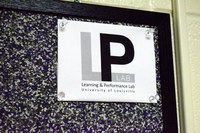Research Focus
 The majority of our research falls under three primary topics:
The majority of our research falls under three primary topics:
1. Exploratory Learning
In traditional classroom instruction, students are given a lecture followed by practice. However, instructors are more frequently using active learning methods to teach and engage students. One method is to give students the opportunity to explore a new topic themselves, before lecture on that topic, such as by inventing a strategy to solve a new problem. Compared to traditional instruct-then-practice methods, we find that exploratory learning increases students’ understanding of the concepts and transfer to new topics. However, there are circumstances in which exploratory learning does not have this benefit. When, and why, do active learning methods like exploration benefit learning? By examining why exploratory learning improves understanding, we can know when and how to apply this method in the classroom. We can also better inform theories of learning more generally.
Representative Publications:
Weaver, J. P., Chastain, R., DeCaro, D. A., & DeCaro, M. S. (2018). Reverse the routine: Problem solving before instruction improves conceptual knowledge in undergraduate physics. Contemporary Educational Psychology, 52, 36-47. doi:10.1016/j.cedpsych.2017.12.003
Newman, P. M., & DeCaro, M. S. (2018). How much support is optimal during exploratory learning? Proceedings of the 40th Annual Conference of the Cognitive Science Society. Madison, WI: Cognitive Science Society.
DeCaro, D. A., DeCaro, M. S., & Rittle-Johnson, B. (2015). Achievement motivation and knowledge development during exploratory learning. Learning and Individual Differences, 37, 13-26. doi:10. 10.1016/j.lindif.2014.10.015
DeCaro, M. S., & Rittle-Johnson, B. (2012). Exploring mathematics problems prepares children to learn from instruction. Journal of Experimental Child Psychology, 113, 552-568. doi:10.1016/j.jecp.2012.06.009
2. Problem Solving Flexibility
In order to solve problems, people must often find novel solutions and break out of rigid and inflexible ways of thinking. What factors lead people to select creative or flexible problem-solving approaches, and what factors lead to inflexible thinking? To investigate these questions, we examine the impact of three core factors on how people select problem-solving strategies: individual differences (e.g., working memory capacity), situation (e.g., method of instruction, performance context), and task characteristics (e.g., demands on working memory). By examining what cognitive processes are required for the task, we can better understanding when a given individual will demonstrate flexibility or mental set. We examine these factors in lab-based studies using insight versus analytical problem-solving tasks. We also examine flexibility using educationally-relevant materials (e.g., mathematical equivalence).
Representative Publications:
DeCaro, M. S. (2018). When does higher working memory capacity help or hinder insight problem solving? In F. Vallee-Tourangeau & L. Ball (Eds.), Current Issues in Thinking and Reasoning. Psychology Press.
DeCaro, M. S., & Van Stockum, C. A. Jr. (2017). Ego-depletion improves insight. Thinking and Reasoning. doi:10.1080/13546783.2017.1396253
DeCaro, M. S. (2016). Inducing mental set constrains procedural flexibility and conceptual understanding in mathematics. Memory and Cognition, 44, 1138-1148. doi:10.3758/s13421-016-0614-y
DeCaro, M. S., Van Stockum, C. A., & Wieth, M. B. (2016). When higher working memory capacity hinders insight. Journal of Experimental Psychology: Learning, Memory, and Cognition, 42, 39-49. doi:10.1037/xlm0000152
3. Performance Pressure
In school, and throughout one’s lifetime, it is common for people to encounter important testing or performance situations (e.g., college entrance exams). In those situations, individuals might not perform at their best, due to pressure of the testing situation. Why do people sometimes choke under pressure? What can help prevent or alleviate choking? Two contrasting cognitive theories have been proposed to explain performance deficits under pressure. People may choke because of distractions and worries that take up valuable working memory capacity needed for performance (distraction theory). Or people may pay too much attention to the steps they are taking (explicit monitoring theory). Our research considers how to reconcile these competing theories, in order to better describe processes that lead to performance failure and success. We use this research to discover potential ways to help reduce choking (e.g., mindfulness, talking aloud during performance). We also examine connections between this research and the problem of test anxiety.
Representative Publications:
Bellinger, D. B., DeCaro, M. S., & Ralston, P. A. S. (2015). Mindfulness, anxiety, and high-stakes mathematics performance in the laboratory and classroom. Consciousness and Cognition, 37, 123-132. doi:10.1016/j.concog.2015.09.001
DeCaro, M. S., Thomas, R. D., Albert, N. B., & Beilock, S. L. (2011). Choking under pressure: Multiple routes to skill failure. Journal of Experimental Psychology: General, 140, 390-406. doi:10.1037/a0023466
DeCaro, M. S., Rotar, K. E., Kendra, M. S., & Beilock, S. L. (2010). Diagnosing and alleviating the impact of performance pressure on mathematical problem solving. Quarterly Journal of Experimental Psychology, 63, 1619-1630. doi:10.1080/17470210903474286
4. Other Topics
In addition to these primary research topics, we collaborate with other researchers to examine how additional factors impact learning. Much of this work is conducted in undergraduate engineering and physics classes. Topics include:
- Collaborative learning
- Social belonging
- Seductive details
- Note-taking methods
- Deliberate practice of visual problem representations in physics problem solving
See our full list of laboratory publications on the Publications page.
